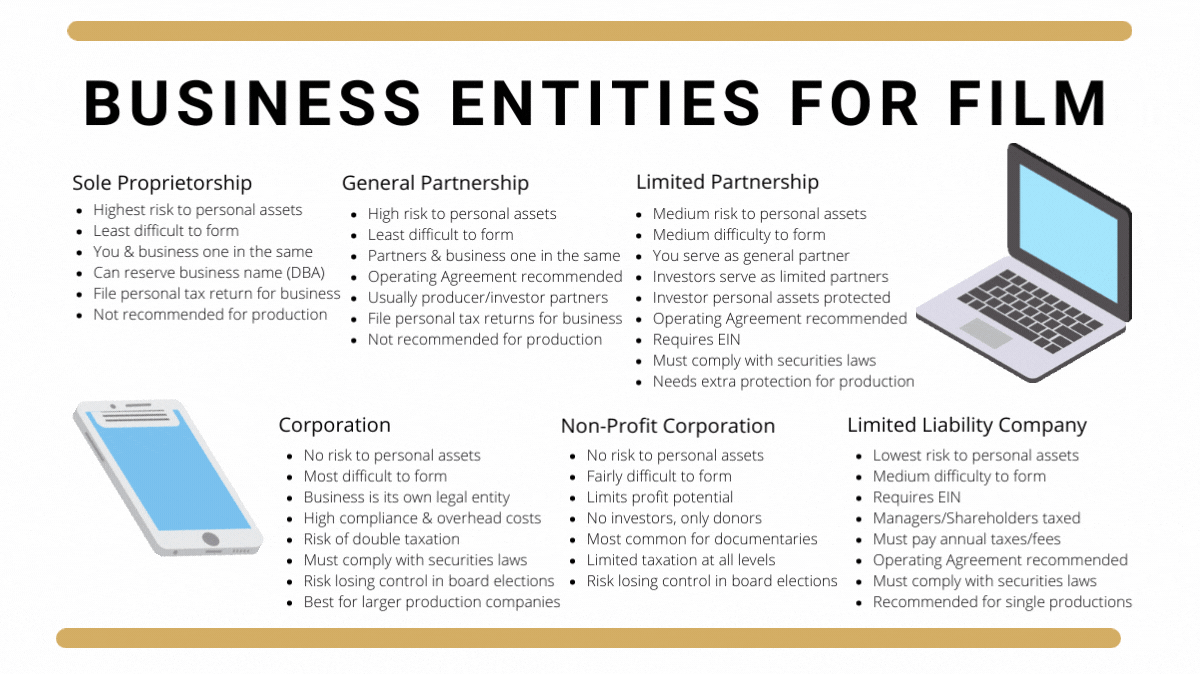
Forming a business entity for your independent film serves two main purposes. First, to protect your personal assets by separating the film’s liabilities, obligations and assets from your own. Second, to organize and facilitate lending and investments for the project.
Having your independent film organized into a separate business entity comes with several other important benefits as well. Most distributors won’t touch a project without an entity to buy from. They want to work with a company headed by a producer that can provide clear chain-of-title and other necessary deliverables. Having a company inspires confidence that you know what you’re doing.
We will cover the essentials of forming a legal entity for your independent film project. Explain the different possible structures available for independent films, and lay out the benefits and drawbacks of each business entity. Since it is the most common entity used for film, we will cover the step-by-step process of creating an LLC.
Jump To
- Should I form an LLC or other business entity for my independent film?
- When should I form a business entity for my film?
- Which business entity should I register for my independent film?
- How to Form an LLC for an Independent Film in 6 Steps
- Which type of business entity is right for my film?
- Which state should I form a company in for my film?
- Form a business entity for your independent film
Should I form an LLC or other business entity for my independent film?
A film business entity offsets personal liability, facilitates financing, is better equipped to handle copyright issues and provides tax benefits. In most cases, a business entity allows you to create a separate legal entity through which to conduct all the film’s business. Thus, offsetting personal liability and opening improved avenues for financing.
Forming a business entity isn’t required by any means, though the benefits often outweigh the risky alternative – making the film in your own name, with a sole proprietorship or general partnership.
Offsetting Risk
With an LLC or corporation, you are effectively able to offset the risk of losing your personal assets should a lawsuit arise from the production or distribution of your independent film. This doesn’t get you off the leash for your own negligence during any phase of production. There is a fine line of liability. Always protect yourself and the production with insurance.
Entice Financiers
Financiers and lenders are more apt to trust you with their money if you have the proper business structure to facilitate their cash and equity. Different business structures allow for different forms of ownership and the divvying up of equity. Evaluate your particular investment and equity strategy before deciding which business entity to form.
Distribution and Copyright
Copyright and chain-of-title issues are almost always simpler when you have an organization to handle them. This feeds into liability. If a lawsuit comes up during distribution, it is likely due to copyright infringement. If you have the appropriate clearances on hand, this shouldn’t be a problem. Additionally, most distribution companies won’t take the risk of buying a film without ensuring the copyright contracts meet their standards.
Tax Considerations
The potential for tax benefits or penalties varies from one entity to the next. In a corporation, for example, the structure may be beneficial to your financing structure, but double taxation can increase costs. Forming an LLC for your film passes the tax obligation onto its members. A non-profit exempts your organization from paying most taxes but has limitations for profitability.
It is highly recommended you create a separate legal entity to produce your independent film under. One that is tailored to your specific needs. Doing so will protect your personal assets and unleash the benefits a business entity offers. As always, this is not binding legal advice. Consult an entertainment lawyer or accountant to evaluate your project and get advice.
Why does each independent film need its own business entity?
Even if you are forming a permanent production company, it’s a good idea to create a separate legal business entity for each independent film you make to avoid commingling financials.
By doing so, you can contain financials, investor equity, debt, contracts and distribution deals, copyright clearances and more under a single project.
If you don’t create individual companies for each film, the financial failure of one project could drag down the success of another. Investors could wield cross-project control. A lawsuit against an aspect of one project could spell financial peril for another.
Avoid these roadblocks. Your investors, lawyer, accountant and books will thank you. When it comes time to file taxes or pay back investors and lenders, everything will be appropriately organized by project. One film’s legal issues or failure won’t be tied to another’s success.
When should I form a business entity for my film?
When you form a business entity for your independent film depends on the complexity of your financing, when you decide to buy the movie rights to a story or when you start hiring employees.
Forming a business entity for your film is essential to protecting yourself. Before a project starts to create personal liability, it’s time to file with the state and offset that liability.
Once you decide on an entity and file the appropriate paperwork, keep in mind that processing times vary. In California, it can take 3-4 weeks for the state to approve LLC filings. Sometimes it can take longer, with more complex entities. Be sure to account for this lag in processing time.
When Liability Starts
Liability can start as early as buying the rights to adapt a book or other media. This immediately concerns your chain-of-title; your documented right to produce a film based on the rights purchase of a derivative work. A clean chain-of-title allows you to sell to a distributor.
Safely Finance with a Film Business Entity
Before you start financing your indie film, form a business entity. Whether you finance through private equity investments, crowdfunding, debt financing against tax credits or pre-distribution sales, grants or sponsorships. Inherent liability exposes you to risk. You will also need a way to divide ownership among or provide shares of the film to investors.
Hiring Crew and Other Employees
Before onboarding your first employee or paying your first contractor it’s a good idea to set up a business entity for your film. You can then properly administer payroll, insurance, worker’s compensation, pay union fringes and taxes.
If that sounds overwhelming, it can be. Once you establish a company for your indie film or show, Media Services is ready to take care of all your payroll, onboarding and employee administration needs! Get a free quote today.

Which business entity should I register for my independent film?
Choosing the right business entity for your film can determine your profit potential and success. Consider how you will finance your indie film and how you will divide ownership, how much you are willing to pay in taxes and how vulnerable your personal assets are.
There are several variables involved in choosing the right business entity for your film. Each entity has unique benefits. Some have drawbacks. While an LLC is the most commonly used business entity for independent film, we will provide an overview of each possible entity. Each has its uses.

Sole Proprietorship
The most basic form of business. A sole proprietorship is, very simply, engaging in business as yourself. If you choose to do so, you can file a fictitious business name (Doing Business As – “DBA”) under which to produce a film.
Note: You must check with state and federal business names and the trademark office to ensure your fictitious name isn’t already taken.
In a sole proprietorship you take on full responsibility and personal liability for your independent film. You are technically operating as yourself, regardless of a fictitious name. Any negligence during any phase of production or distribution resulting in lawsuits will be brought against you personally. Your assets are at their highest level of risk.
This form of doing business is not recommended. The risk outweighs the benefit in most situations. However, if you are just getting started on a very small budget, this is a simple solution to reserve your business’s name, file copyrights, and field early interest in your project. You can file to convert the name to a separate legal entity when interest in your project picks up and you wish to take on investors.
General Partnership
When two or more people work together to start a for-profit venture, this is considered a general partnership. Similar to a sole proprietorship. All liability, in the event of a lawsuit, falls on the co-owners. This puts individual assets at risk.
If you enter into this type of business relationship, define the nature of the partnership up front. Codify the rules of the road in a written and signed partnership agreement. Cover general operations, the duties of each member and how rights and creative control are shared among members. Decide who runs the set before getting to set.
Maintain Control of Your Film with a Partnership Agreement
Under the law, whether partners file to be in a general partnership and create an agreement or not, that is what they are considered. In California, for example, if a partnership agreement isn’t established the law will split assets and liabilities equally among members regardless of actual participation in the business. They will also split creative control of the film equally.
If you intend to hold creative control of your film, then it is best to design a partnership agreement that allows you to hold a controlling interest.
Regardless of the partnership agreement, certain states require standard provisions. In California, all partners have the right to formal accounting and record keeping practices and access to the books. All partners must disclose privileged information to each other regarding the film business. Get familiar with your state’s laws before partnering up.
Potentially Valuable for Small Films
This arrangement is not common for independent film. It may be viable for smaller projects or the early stages of a project, headed by a filmmaker and one or two investors. All partners must have a tolerance for risk. A lawsuit would be brought against their personal assets.
Limited Partnership
A limited partnership is like a general partnership with some added complexity, allowing limited liability for certain members. In this arrangement, there are general partners and limited partners. As its own legal entity, you will have to get a federal employer identification number (EIN). Which you will need to file taxes, open a bank account, debt finance and hire employees.
General partners have about the same rights, personal liabilities and duties as they do in a general partnership. They are responsible for running the day-to-day operations of the independent film and wield creative control. The producer would take the position of general partner.
There is the issue of protecting yourself from personal liability. Before LLCs were created, you would form a corporation for yourself. The corporation then serves as the general partner and your personal assets are protected. This route may still be optimal based on your individual needs.
Investors are Protected
This form of business entity is useful when involving a small number of investors that are willing to risk the cash to get your film made but aren’t willing to risk their personal assets. In exchange for limited liability and no creative control of the film, investors can effectively offset liability by becoming limited partners.
Technically, for an investor to join as a limited partner they are sold securities. Consult a lawyer. You need to comply with state and federal laws to sell securities.
Maintain Creative Control of Your Film Effectively
A limited partnership works nicely to maintain your creative control of the project and keep investing partners from interfering. If a limited partner does attempt to make creative choices, they may be crossing the line into becoming a general partner. It does well to remind them of this fact. With that in mind, you can speak with investors without their status changing. They cannot enforce a decision.
Rights Vary by State
Limited partners have rights which vary by state. In California, the partnership entity must keep financial records and income tax returns. Limited partners must have access to these records. If a limited partner has a 10% stake or more in the partnership, they can call meetings.
If the limited partnership has greater than 35 investors listed as limited partners, the entity must distribute financial statements annually.
A written agreement is highly recommended. Otherwise, the state will decide the terms of the partnership for you. Include provisions in the agreement that clarify the terms of the partnership and the role of each partner. Add a provision to outline how a partner can exit the entity and release liability, if any. Organize credit, deductions, income and losses in the agreement to simplify tax season.
Equity and Startup Costs
This type of business entity is useful if you prefer to limit investors’ ability to interfere creatively. And if you wish to limit investor equity to preserve your share of the film. Selling a security to an investor is a more familiar and cleaner way to do it. You will, however, incur greater startup costs forming the limited partnership and a corporation to protect yourself. Along with legal fees to remain compliant with government securities regulation.
Corporation
A corporation excels at offsetting personal liability for everyone involved. This type of film business is its own legal entity, completely removed from the filmmaker and investors involved in it. This effectively protects you and investors from lawsuits filed against the corporation.
A corporation does require a significantly more complex structure and proper establishment to receive the intended benefits. In some states, a minimum franchise tax board fee is collected annually – regardless of profitability.
Startup Capital and Compliance
You should only form a corporation with sufficient startup capital. An appropriate amount to produce your independent film, for the cost of filing articles of incorporation and maintaining the entity. Otherwise, it could be ruled a shell corporation and revoke your protection. Avoid this.
Create separate corporate bank accounts and books. Keep a record of meeting minutes and document all corporate actions. Indicate clearly that the corporation is acting in its own interest and not solely on your behalf.
Once established, you or your shareholders will choose the board of directors. Directors then choose the President, Vice President and Treasurer. All meetings must be carefully documented – minutes must be carefully stored in the event of legal action. Bylaws must be created and codified in writing.
Selling Securities to Distribute Equity in Your film
To involve investors in the film business you sell securities. Again, the sale of stock must follow government regulation and will often require full disclosure to potential investors. This way there are no surprises, and you remain compliant. Always consult a lawyer before offering securities. You could face criminal charges if securities are offered and sold improperly.
Avoiding Double Taxation
While tax deductions particular to a corporation can help save your project money, double taxation is cause for a headache.
To avoid paying twice the tax, you have a couple of options. You can pay directors and officers reasonable salaries (in respect to overall financials) or supply dividends to shareholders out of your net income. Shareholders would then face taxation on those dividends. Without net income at year-end on the corporate level, there is nothing to tax.
You could also avoid double taxation with an S-Corp. The corporation is seen as a partnership for tax purposes. The corporation doesn’t pay taxes. Profits and losses are shouldered by shareholders. An S-Corp for an independent film cannot have in excess of 75 shareholders who must all be legal residents. Only one class of securities can be sold.
Complexity for Protection
Forming a corporation for your film may sound overly complex, though there are benefits that may suit your needs. It is undoubtedly a clean and professional way to preserve copyright, offset liability for all parties involved and distribute equity in the project. You can deduct certain expenses that you could not with other business entities for film, and you can potentially operate in multiple states more easily.
This model may work for you if you are confident in your ability to deliver. A board of directors will have final say. If they feel you are underperforming, they can vote to remove you.
Corporations can own LLCs. If you plan to open a production company, a corporation may be a workable solution. You can streamline the operation of the larger business while separating each of your project’s obligations and assets into their own LLCs.
Be sure to weigh the benefits with start-up costs. Don’t incorporate if funding is unavailable to do so. If this seems like a potential route, you can request a name from the state ahead of filing letters of incorporation.
Non-profit Corporation
Often used for documentaries funded by grants. A non-profit corporation must follow many of the same laws of formation and compliance as a regular corporation. The benefit is you aren’t required to pay most taxes resulting from film production or other business activities.
Tax Write-Offs Instead of Equity
If you want to involve private money from high net-worth individuals, they wouldn’t be directly investing in your independent film. Rather, they would be making a donation.
Donations are a great way to involve investors who want a sure thing – a tax write off, and who don’t wish to have any further involvement. With donations, investors hold no claim to equity in your independent film business entity.
Note: Many states require you to register as a charity before accepting donations, check local regulations.
Since no equity is distributed to private investors, this is a great way to preserve copyright, which the non-profit corporation will hold exclusively. Control of that copyright wouldn’t land solely in your hands. Rather, it would be at the mercy of the board of directors and the officials they elect.
No Taxes and No Profit for Film
The major downfall here is your inability to turn a profit. For that reason, this method isn’t generally recommended unless you intend to use revenues to continually create documentaries or other independent films.
You are allowed to pay salaries to officers of a non-profit film business entity, but those positions are filled and regulated by the board of directors. It’s not guaranteed you’d be elected. Even if you were initially, many states require annual re-elections, making the position unstable for a producer in the long term.
If you wish to turn a profit and simultaneously qualify for free money in the form of grants and accept donations, fiscal sponsorship is an outstanding alternative. With a fiscal sponsor, you establish a business entity for your film as you normally would and accept grant money and donations through the fiscal sponsor. To learn more, read our piece on fiscal sponsorship.
Forming a Limited Liability Company (LLC) for an Independent Film
Perhaps the most common, streamlined and beneficial independent film business entity. A limited liability company or LLC integrates the best pieces of a corporation and a partnership.
Forming an LLC creates a legal entity separate from its members, relieving members of an independent film’s debts, obligations and litigation against personal assets.
Much like a partnership, two classes of members are possible. Managing members and non-managing members. Managing members run production and generally oversee the making of the film, holding creative control of the project. Non-managing members are typically investors who don’t wield any creative control.
Both classes of members are granted limited liability.
Form a Manager-Managed LLC for Film
When you form your LLC, make certain to alert the state of the type of LLC you intend to form. It will be assumed that you are forming a member-managed LLC, where all members have equal creative control of the project. You want to avoid this to preserve the majority share of equity and maintain creative control. When investors are involved, you want to form a manager-managed LLC. Name yourself, the producer, manager. You take on the responsibility of running the LLC and making the film happen, from development through sales.
When you list yourself and other producers (who aren’t employees) as managing members and passive investors as non-managing members, this sets an official and indisputable line of creative control for the film.
The LLC can also hire a non-member to act as an agent of the LLC, with the same power as a manager and the ability to enter the LLC into binding contracts. If you need another producer or production manager to help jumpstart the project, you can hire an outsider without giving up any equity in the independent film business entity. If you can pay them a salary, that is.
An LLC allows you to distribute equity in the film via securities based on the determined value of each stock and the amount of cash an investor puts into the project. Whenever you sell securities to investors, consult an attorney. You must comply with state and federal securities laws or face criminal penalties.
Taxes and an Airtight Operating Agreement
Double taxation is avoided in an LLC. The company does not file a federal tax return with the IRS, only an informational form.
Members file the LLC’s income and losses on their individual federal tax returns based on the number of shares they each hold. Certain states do tax LLCs and have annual minimums regardless of profit.
An operating agreement should be put together to codify these details. Doing this will avoid any confusion about these variables and more, from naming the manager to the distribution of equity and how the independent film can be sold. It is incredibly important that every detail is laid out in writing.
LLCs are Filmmakers’ Preferred Business Entity
An LLC is by far the most efficient form of business entity used in independent filmmaking today. It allows for the complexity of a corporation and the sale of securities, with less paperwork and reporting. It eliminates double taxation and puts the tax burden on its members based on their share of equity.
Due to its widespread use, we will cover the steps necessary to form an LLC as your independent film business entity.
How to Form an LLC for an Independent Film in 6 Steps
1. Name Your Film’s LLC
Formulate a fictitious business name (DBA) for the LLC that is relevant to the project and the business. Most producers name the LLC after the title of the film.
States generally don’t allow you to register a name that’s already in use. Search your state’s business name database before filing paperwork to determine whether your chosen name is available. These databases are typically easy to access online.
Be sure to check for similar trademarks as well with the United States Trademark and Patent Office to avoid trademark infringement.
2. Select a Registered Agent
Most every state requires an LLC to select someone as its registered agent. The registered agent must be in the state you intend to operate in. This could be you, the producer. Someone you intend to hire as an agent of your LLC. You can even hire a service to provide a registered agent.
A registered agent is responsible for receiving and appropriately distributing official documents, subpoenas, or lawsuits for the LLC to its managers.
3. Create an Operating Agreement for Your Film’s LLC
An operating agreement is vital to avoid conflict down the road, when all you want to focus on is selling the film to distributors, not litigation.
This document should be the end-all-be-all of your LLC. It should encapsulate everything necessary to keep the LLC out of trouble and members happy. Include roles and responsibilities of managing members – who reports to who, the distribution of equity among investors and parameters for the sale of securities, a legal route for a member to leave the LLC or if a member dies, a termination provision if you need to dissolve the LLC and anything else you and your lawyer decide should be included.
Even if an operating agreement isn’t legally required by your state, it’s strongly recommended you create one. This way there is no confusion about who makes the decisions, who owns the film and how much they own.
4. File Articles of Organization with Your State
When you are ready to file your articles of organization, you will file with the Secretary of State. Typically, you (the manager) will sign the articles of organization. Some states require that your registered agent sign as well.
The articles of organization should include the name and address of the LLC, the name and address of the registered agent and the purpose of the LLC at minimum. Check with your state to see if they require anything more.
If you plan on doing business in multiple states, you may need to file articles of organization in each state you plan on filming in. In some cases, this depends on how much business you intend on doing in a state. As always, research the states you want to work in and plan ahead. If you do need to file in another state, you will need a registered agent in that state.
5. Apply for an Employer Identification Number (EIN)
Once your articles of organization are filed and accepted, the state will issue you a document certifying your LLC officially exists and can commence business.
You will then want to apply for an Employer Identification Number, abbreviated as EIN. Also known as a Federal Employer Identification Number. This number, like your social security number, identifies your newly certified legal entity for tax purposes. It also allows you to begin hiring and onboarding employees. The IRS makes it easy to apply for an EIN when you’re ready to do so.
Hiring and onboarding can get a little tricky when it comes to government regulation and compliance. TiM digital onboarding is an efficient, private and compliant onboarding tool built specifically for independent creators and studios alike. It works with Media Services’ payroll services seamlessly!
6. Open a Business Bank Account and Obtain Film Permits and Licenses
Finally, it’s time to open a business bank account. This is a must to separate your personal financials from the business. Having a business bank account will also simplify the financing process. Separate LLC finances from you own to remain compliant. You need somewhere to safely stash grant money, loan funds and investor cash.
Depending on your state of business, you may also require certain permits or licenses to begin production. You will want to take care of general permits and licenses upfront, in advance of filming. If you plan on filming on location, this may also be a suitable time to investigate location permits. Get familiar with local processes to avoid surprises.

Which type of business entity is right for my film?
Deciding which business entity is right for your film relies on many factors unique to your situation. Often, you want to consider financing, profit potential, and copyright control and ownership. How do you plan on financing your independent film? How many investors will you involve? What is your appetite for risk? Who calls the shots on set? How do you want to sell the film?
These are just a few questions you’ll want to think about.
If you can handle infinite risk to your personal assets and you’ve convinced two or three investors to fund your film, a limited partnership might be the answer for a micro-budget film. It requires a small amount of overhead, and you can get to work quickly. Always buy insurance.
If you have a complex production with dozens of investors and are an ounce risk averse, insurance alone isn’t going to cut it. You will want to consider an LLC or corporation. This way you can offset liability and divvy up equity without dispute.
Always consult a lawyer and accountant for guidance before making a decision. Lay your plans out and get professional advice. It’s a tried-and-true way to avoid trouble down the line.
Which state should I form a company in for my film?
When you form a business entity for your independent film, you can incorporate in any state. Typically, your home state or the production state will be the best choice.
While benefits of incorporating a business entity for your independent film in Delaware or Nevada might sound attractive, you must consider your needs and finances.
If you form an LLC in Delaware to reduce your tax burden, but you plan to do most of the filming and business in California, you will likely have to register as a foreign business entity and may still have to pay a minimum tax to the state.
If you incorporate outside of your primary state of business, you will have to hire a service to serve as your registered agent in that state.
On the flip side, if you plan on filming in several different states, it may be wise to form your business in Delaware or Nevada. These states do not tax an LLC if most of your business is conducted elsewhere. In Delaware, filing and standard franchise tax fees are minimal. In Nevada, there is no franchise tax fee, only annual filing fees.
Where you form a business entity for your independent film will depend on your specific needs. Consider filming locations and cost. If you plan to apply for tax incentives, this could impact your decision. If you have questions about film tax incentives and financing, reach out!
How much does it cost to form a business entity for film?
The cost of forming a business entity for your independent film can range anywhere from a few hundred dollars to thousands. Every state is different and will require varying filing fees and taxes.
Sole proprietorships and general partnerships are the least complex and are therefore the most affordable. These structures usually do not offer enough protection. They can, however, get the ball rolling. With a small filing fee, you can reserve a business name.
The most common business entity for film, LLCs have a wide range of price tags. From $50 in New Mexico and no annual fee to $90 in California with an $810 minimum franchise tax board fee.
Form a business entity for your independent film
Forming a business entity for your independent film is essential to getting your project made and on the festival circuit.
When you form a business entity, you are able to effectively wield creative control and a favorable amount of equity. Investor’s are more willing to buy regulated and transparent securities. Lenders are more comfortable working with a company that has a business bank account. Distributors will find confidence in your professionalism and copyright when they fall in love with your film.
Protect your personal assets with a solution that’s right for you and your project. There are many factors to consider. Never compromise the integrity of the film. Nothing is more important than offsetting personal liability, properly distributing equity, holding a clean chain-of-title and preserving your ability to sell and make a profit from you independent film.
Next: Learn about financing your independent film.
